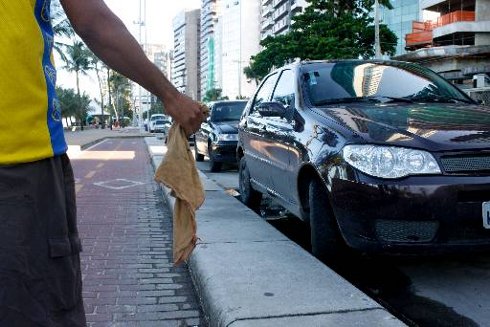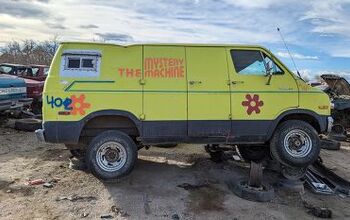My Friend, The Flannel Man

I parked and was thinking of the day ahead. I didn’t notice the black shadow approaching my car. When I looked over I was quite startled. Oh no! A flanelinha!
In almost all Brazilian cities, the flanelinha is a fixture. Flanelinha (which loosely translates as flannel man, as in the rag) is the demure name given to the “workers” who divide the streets among themselves and charge drivers to park. Their excuse is that they’re taking care of your car. If you don’t pay up, a fat tire or a big scratch will be a symbol of your chintzyness.
Most people just pay, but I go a different route. I tell them I’ll pay when I get back and, if it’s a place I don’t go often, I just drive off. Not a good strategy where I would be parking in downtown every day now. Instead, I decided to befriend the flanelinha.
Take João. I’ve known him for about ten years when he carved out his turf near my former place of work. At first, I ignored him and he didn’t bother me much. Later, his insistence grew. I realized that I needed to acknowledge his existence. Like most flanelinhas, João also washed cars. I asked João how much he would charge me for a wash. We reached an unspoken compromise. In return for washing my car every once in a while, he largely left me alone. To further improve our understanding, I would also give him old clothes on Christmas and his birthday.
As time went on, the Brazilian car market exploded. More cars on the street, more competition for parking. Regulars like João started reserving spaces for steady customers like me. Sometimes, I’d arrive at work, double park, hand him the keys and he would put the car away (somewhere) for me. At the end of the day, I would look for João, give him some change on most days, and drive away.
It was a mutually beneficial relationship. João would keep my car keys. If it became necessary, he’d fill up the meter. Through his customers’ payments, João became a functional member of society. At first, he came to ”work” on foot or by bus. Then he bought a bicycle. About 6 years ago, the grand prize: He bought a very beat-up, bare bones, 2-door, 80-ish, Fiat Premio. At the time he bought it, the car was worth about R$5,000 ($2,600). Three years later, João traded up to a mid 90s, 4 door Premio. With power steering and windows. On my last few days at work, João surprised me yet again. Working on the streets, collecting change, João had somehow scraped up enough money to buy a shiny, silver, 7 year-old, Uno Mille with AC (newer than my own car!). I congratulated him on his progress and told him I’d soon be gone and he no longer needed to keep space for me. He thanked me and wished me luck.
Back to today, I’m facing the challenge of dealing with these guys again. I handled the situation by not giving the flanelinha any money. Instead, I looked him square in the eye and told him I’d be parking the car there everyday. After my business was done, I returned to my car and silently let out a breath of relief as no damage had been done. Of course, the flanelinha was there. I asked him his name. I asked him how much to wash my car. I grumbled about the price. Tomorrow, I’ll ask him to wash the car. Time to make a new friend.

More by Marcelo de Vasconcellos
Latest Car Reviews
Read moreLatest Product Reviews
Read moreRecent Comments
- Theflyersfan If this saves (or delays) an expensive carbon brushing off of the valves down the road, I'll take a case. I understand that can be a very expensive bit of scheduled maintenance.
- Zipper69 A Mini should have 2 doors and 4 cylinders and tires the size of dinner plates.All else is puffery.
- Theflyersfan Just in time for the weekend!!! Usual suspects A: All EVs are evil golf carts, spewing nothing but virtue signaling about saving the earth, all the while hacking the limbs off of small kids in Africa, money losing pits of despair that no buyer would ever need and anyone that buys one is a raging moron with no brains and the automakers who make them want to go bankrupt.(Source: all of the comments on every EV article here posted over the years)Usual suspects B: All EVs are powered by unicorns and lollypops with no pollution, drive like dreams, all drivers don't mind stopping for hours on end, eating trays of fast food at every rest stop waiting for charges, save the world by using no gas and batteries are friendly to everyone, bugs included. Everyone should torch their ICE cars now and buy a Tesla or Bolt post haste.(Source: all of the comments on every EV article here posted over the years)Or those in the middle: Maybe one of these days, when the charging infrastructure is better, or there are more options that don't cost as much, one will be considered as part of a rational decision based on driving needs, purchasing costs environmental impact, total cost of ownership, and ease of charging.(Source: many on this site who don't jump on TTAC the split second an EV article appears and lives to trash everyone who is a fan of EVs.)
- The Oracle Some commenters have since passed away when this series got started.
- The Oracle Honda is generally conservative yet persistent, this will work in one form or fashion.






































Comments
Join the conversation
From 1964 to 1967, when I was between 5 and 8 years old, I lived in Baltimore, MD, just a few blocks north of Memorial Stadium where the Orioles and Colts played. During baseball season, many game attendees preferred to park in the neighborhood rather that at the stadium. I don't know if it was because of the fees charged or lack of stadium parking space. The neighborhood kids and I used to stand in the middle of parking spaces and demand a quarter to get out. We all earned some penny-candy money that way.
Hi Marcelo!!! Since I'm from Uruguay I have to live with these urban characters, we call them "cuidacoches" (think you don't need translation). And the worse ones appear when there's a soccer game or big show, asking for money before you leave the car. Their fares can be about R$ 5, 10 or more (in local pesos of course!!) and there's the default answer in case you refuse to give them any money: "if something happens to your car, I'm not responsible so don't complain and don't say I didn't warn you". I've driven from Uruguay to Florianopolis-SC twice, and I couldn't find a single "flanelinha". Of course I used the hotel parking but when driving to the beaches of Ilha de Santa Catarina from Canasvieiras, those boys did not show up. I parked my car at such places as Jurere, Barra da Lagoa, Campeche and many others, nobody asked for a single real...but never went further in Brazil than Florianopolis. This is a very, very big country and my experience is of course very limited.... Need to travel more and see as belezas do Brasil!!!! Parabens Marcelo!!